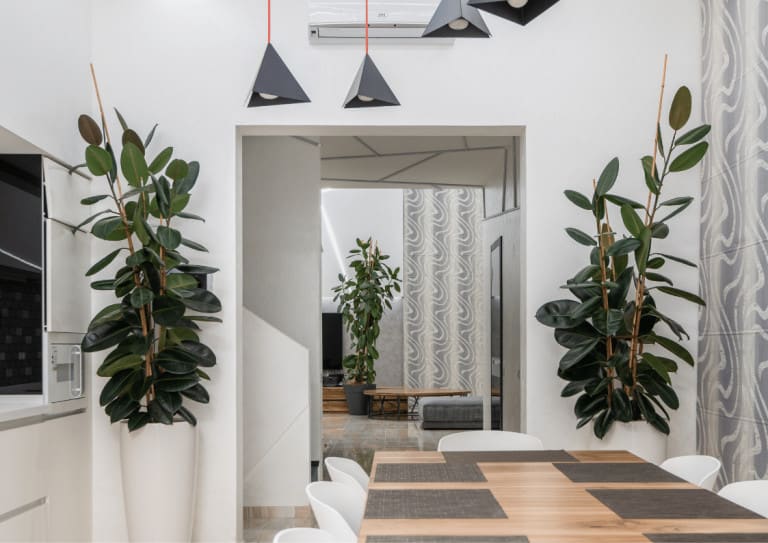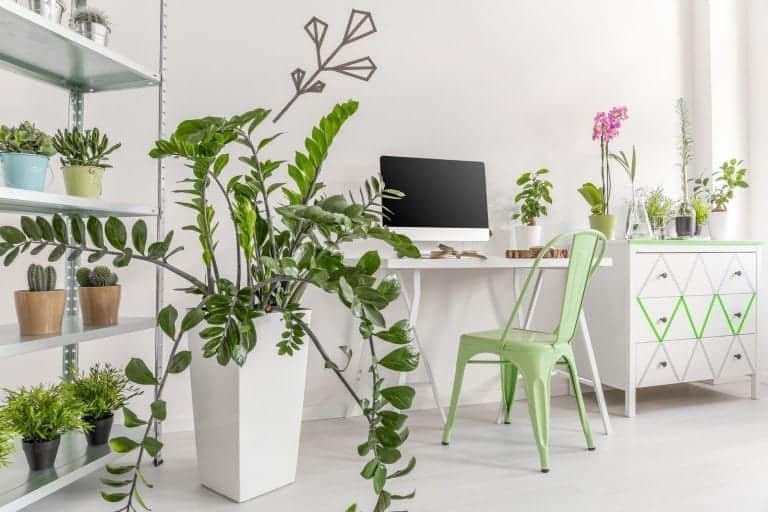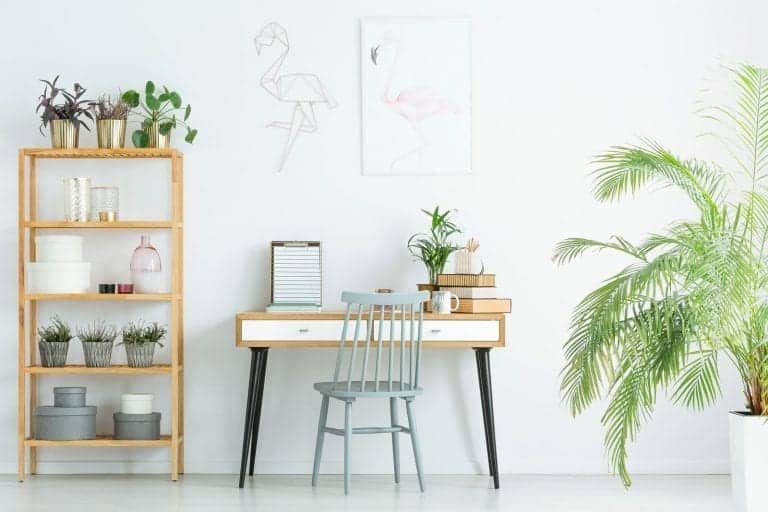The Benefits Of Indoor Plants In The Office {Natural Decor}
-
Chris Dosser
- March 14, 2022
If you buy something using the retail links in our articles, sometimes we earn a small affiliate commission. This does not impact the products we recommend.
The most important goal of designing an office space therefore should be to create a stimulating environment – one that you want to be in, and one that sparks you to work at your best.
The easiest and most natural way to create a calm, fresh, and vibrant atmosphere in a bustling office space is to bring the outdoor world indoors. Specifically by de-urbanizing the stereotypical working office through introducing an array of indoor plants to the workspace.
Our inherent connection with nature, which is recognized by scientists as ‘biophilia‘, can in fact be used to our advantage.
Research findings have shown that introducing indoor plants to your office can bring powerful benefits including:
- Reduced stress levels experienced by employees
- Increased focus amongst workers
- Decrease absence rates amongst employees
- Improved employee wellbeing
- Improved air quality within the office
- Greater creativity levels displayed by workers
- Indoor plants provide beneficial companionship

Proof that plants help in dealing with stress
Research by Kaitlyn Gillis and Birgitta Gatersleben of the University of Sussex establishes evidence linking indoor plants to improved pain tolerance and stress relief. The research report states that welcoming plants into indoor environments can in fact bring a multitude of benefits.
In addition, the research also reflected on different psychological studies that establish the health and wellbeing benefits of indoor plants. For example, the groundbreaking research findings by Roger Ulrich in 1991 revealed that hospital patients with a view of outdoors required limited pain medication.
Another research study by the New University of Technology, Sydney, in 2010 established a promising reduction in stress among workers with the introduction of plants in the workspace.
The findings of the study implied the following outcomes among workers:
- 38% of workers reported a reduction in fatigue
- 37% reported a fall in anxiety and tension
- 44% reported a reduction in hostility and anger
- 58% of workers reported a drop in dejection or depression
Despite the small sample size for the study, the researchers clearly found that one plant in every workspace played a significant role in boosting the morale of workers.
Subsequently, the research also established the impact of indoor plants on the improvement of employee wellbeing and performance.

Houseplants help regain focus at work
Another promising benefit of indoor plants is their capability to help us recharge our attention capabilities.
According to researchers from the University of Michigan, urban environments are becoming increasingly populated with dramatic stimuli.
Dramatic stimuli refer to the distractions which require our immediate attention, and we cannot help but respond to them subconsciously. For example, being conscious of avoiding traffic.
However, the different perceptions and management of immediate direct stimuli in the workplace have diverse consequences. For example, responding to an email that requires an immediate reply can appear something like preparing for battle!
Interaction with nature can help considerably in such cases.
Plants have a calming effect, which helps an individuals consider stimuli with intrigue as opposed to automatically responding.
The research also indicates that simple interventions such as introducing pictures of nature have a positive impact on worker’s productivity.
Therefore, bringing indoor plants into an office space can make sure all workers respond to specified instructions effectively, with better productivity and speed.
Incorporating plants into offices helps lower employee sick leave and improve wellbeing
Plants symbolize nature, and a majority of known indoor plant benefits is associated with this symbolism.
When you connect with nature, the resulting feeling of vitality can have a impact on your daily routine and your way of life in general.
According to the Human Spaces report of 2015, when considering 7,600 office workers across 16 countries, around 58% of the workers did not have any live plants in their workspaces.
Interestingly, workers from an office environment that has adopted natural elements such as desktop plants indicated an almost 15% rise in subjective wellbeing score. In addition, these workers also reported a 6% increase in productivity scores.
Another research study by the Agricultural University of Norway in the 1990s established the psychological impact of indoor plants on the reduction of tiredness symptoms such as concentration issues and fatigue. Growing indoor plants not only calms the employees but also gives them a positive lift in their working environment.
When employees feel well, they can be trusted to re-evaluate their own state of mind.
Based on the positive reaction of working alongside plants, employees were then more likely to suggest new avenues for improving productivity. At the same time, lower absenteeism and reduction of sick pay remunerations present vital promises for businesses. All just by adopting indoor plants into the office design!
Which plants will thrive best in your own office will depend on a number of environmental factors such as light and temperature.

How do indoor plants create fresh air?
Indoor plants improve the quality of air in an office space, and there is a lot of research to back this statement up.
Indoor plants can help in the reduction of common toxins and pollutants that are found in indoor spaces such as benzene and formaldehyde. A research study reflecting on the impact of various indoor plants on the removal of eight different organic compounds in indoor spaces in a 12- hour period revealed the following:
- The bromeliad plant is capable of removing over 80% of six volatile organic compounds
- The dracaena plant is capable of removing almost 94% of acetone. (Acetone is the pungent compound you can find in many nail polish removers!)
According to Gary L. Altman, the associate director of the Horticultural Therapy Program at Rutgers, various factors determine the ability of plants for air purification.
He stated that factors include the number of toxins in the air and the size of the plant and the indoor space. The good news is that placing around 6 or 8 medium to large plants in a room can bring a notable difference in air quality.
In addition, businesses who incorporate plants into their office design have minimal complaints from employees regarding wellbeing.
Indoor plants foster creativity amongst workers
The impact of indoor plants on the creative mind of employees is another vital reason to consider them when designing an office.
Imagine the fresh perspective you can get by trekking to the top of a mountain and pondering over your thoughts whilst gazing at the endless horizon! That feeling of invigoration is what nature does to you!
- According to a study at Texas A&M University, employees with indoor plants in their office were 15% more likely to develop creative ideas
- In addition, the study also determined that employees with indoor plants in office spaces were more likely to develop creative solutions to issues and showcase innovative thinking.
- Another research study at the University of Exeter in the UK revealed that employees with indoor plants in their workplace design achieved a 15% rise in creativity
So, having indoor plants can help businesses encourage their employees to derive innovative solutions for modern business problems. On the other hand, you as a worker from home can rediscover new perspectives and introspect into your skillset with improved creativity nourished by indoor plants.
Plants create a vibrant and energetic workplace
Plants have many benefits in store for us if we know how to incorporate them into design correctly! Indoor plants add a vibrant feeling to an office space by bringing colour alongside complementing other aspects of workplace design.
For example, plants could help break up direct and dazzling sunlight or assist in masking any unattractive features of the office.
When the workplace vibe is energetic, you can expect higher levels of energy from employees. If bringing a desktop plant to decorate each desk is able to fire up your enthusiasm for work then it’s a low risk high reward purchase.
Caring for plants nurses responsibility
Indoor plants in the workspace can also have a promising influence on the accountability of employees. Studies have established that taking care of plants can improve the quality of life of an individual due to the sense of ownership, responsibility and accomplishment.
Furthermore, the responsibility of taking care of an indoor plant can also encourage other behavioural traits. As a result, employees can develop better accountability for their actions in their professional life.
Plants can be therapeutic companions
Finally, the impact of having indoor plants in office spaces extends to deeper psychological healing.
Caring for indoor plants can lead to the development of companionship with the plant that helps in faster recovery from injury or illnesses.
For example, employees can develop personal and specific goals for measuring their wellness, just like a routine for taking care of indoor plants.
As employees develop bonds with indoor plants, they can develop goals for tackling all sorts of difficulties, obstacles, and problems effectively.
The therapeutic impact of indoor plants can help employees with psychological issues such as post-trauma stress disorder (PTSD) and vocational skills such as decision making.
Are you ready to rediscover your love for an office space with indoor plants?
We can only marvel at the various benefits plants bring to us, as we near the end of our discussion.
Indoor plants reduce stress, promote creativity, help in reducing sickness of employees, and giving them fresh air to breathe and bring them a workplace that gleams with energy.
In addition, employees can improve their focus and attention with indoor plants in the office space alongside developing their accountability.
The overall impact of indoor plants in an office space depends on their capability for emulating a natural environment indoors. And, years of scientific research have established the positive impact of greenery and interaction with nature upon the health and psychological state of humans.
It’s never late to take advantage of a new opportunity that makes a better and more profitable workplace. Start exploring some of the best indoor plants for own office today!
References
https://www.ciphr.com/advice/plants-in-the-office/
https://www.prevention.com/health/g27586276/benefits-of-indoor-plants/
https://www.wework.com/ideas/office-design-space/benefits-of-indoor-plants-in-the-office/
https://www.theplantman.com.au/benefits-of-plants-within-your-office/

Chris Dosser
Co-Founder of Eden Indoors
Chris is a self-taught horticulturist with over a decade of experience caring for houseplants and creating lush, thriving indoor oases. He specializes in Monstera, and by self admission has a serious problem with buying and propagating rare indoor plants!
Similar Posts
My Staghorn Fern Shield Frond Is Brown – Is This Normal?
Leaves and foliage turning brown is often a sign of danger for a plant....however not always! Case in point being the shield fronds of a Staghorn fern.
Are Rubber Plants Toxic To Cats? [Latex Alert!]
Rubber plants are extremely popular houseplants, but do they have the potential to be harmful to our pet felines?




Pingback: Are Calathea Poisonous To Cats? (A Quick Rundown) | Eden Indoors